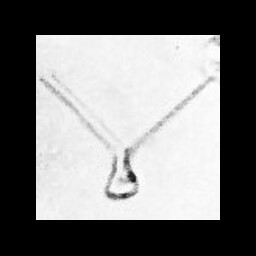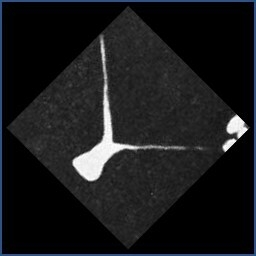Furcatolithus distentus
Set number: 844
-
1
-
2
-
3
-
4
10µm
Set number: 845
-
1
-
2
-
3
-
4
10µm
Set number: 846
-
1
-
2
-
3
-
4
10µm
Furcatolithus distentus Martini, 1965
Sphenolithus distentus (Martini, 1965) Bramlette & Wilcoxon, 1967
Small to medium size furcatolith having a duolithic biconical apical spine with or without bifurcation and a hollow moderately high cylindrical cone shape proximal cycle. In the axial section, the apical spine is kite shape with an obtuse angle at the proximal end. In cross-polarised light, the apical spine with axial c-axis shows maximum birefringence at 45° but extinct (dim) at 0° [the axial suture between the two helves is better seen at this orientation].
Furcatolithus distentus and Furcatolithus ciperoensis (Bramlette & Wilcoxon, 1967) Howe, 2021 are both having kite shape apical spines in the axial section. They differ by the angle of the proximal end. Furcatolithus distentus have obtuse, whereas Furcatolithus ciperoensis have an acute angle at the proximal end.
In the axial section, the apical spine is conical in Furcatolithus celsus (Haq, 1971) Howe, 2021 and Furcatolithus predistentus Bramlette & Wilcoxon (1967) Howe, 2021, therefore boundary between the apical spine and the proximal cycle is flat.
Bergen, J. A., de Kaenel, E., Blair, S. A., Boesiger, T. M. & Browning, E. 2017. Oligocene-Pliocene taxonomy and stratigraphy of the genus Sphenolithus in the circum North Atlantic Basin: Gulf of Mexico and ODP Leg 154. Journal of Nannoplankton Research 37(2-3): 77-112.
Bramlette, M. N. & Wilcoxon, J. A. 1967. Middle Tertiary calcareous nannoplankton of the Cipero section, Trinidad, W.I. Tulane Studies in Geology and Paleontology 5: 93-131.
Haq, B. U. 1971. Paleogene calcareous nannoflora. Parts I-IV. Stockholm Contributions in Geology 25: 1-158.
Howe, R., 2021. Ultrastructure and taxonomy of the family Sphenolithaceae. Journal of Nannoplankton Research 39(1), 29-75.
Martini, E. 1965. Mid-Tertiary calcareous nannoplankton from Pacific deep-sea cores. Colston Papers 17: 393-411.

